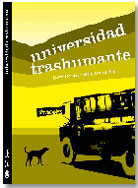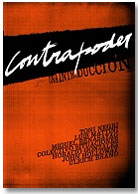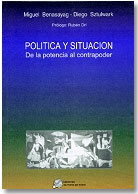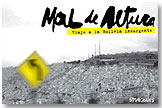Líneas de investigación
Proyectos en Curso
Proyectos Anteriores
 Rutas de la potencia. En la América Latina de los contrapoderes
Rutas de la potencia. En la América Latina de los contrapoderes  Seminar Routes of Power
Seminar Routes of Power
Seminar Routes of Power |
|
Venue:
PRESENTATIONPRESENTATION Rutas de la potencia (Routes of Power) is the name of a series of journeys through Latin America undertaken in 2005 by the Colectivo Situaciones group (Argentina) and coproduced by UNIA arteypensamiento (Andalusian International University).
While the image presented by today's Latin American politics attempts to reflect progressive governability and the region's political systems strive to impose themselves once again by proclaiming the end of the recent battles against neo-liberalism which raged throughout the continent, our jouney was driven by another motive: that of making contact with practices which in themselves create a new vision, a new age and a new way of doing things. These experiences are the starting point from which new lands can be opened up and the challenges faced of how to spread the news and prolong their emancipating effects. These actions are also protagonists of the current crisis, creating moments of political sadness, producing the keys and the problems common to today's radicality. Of the four journeys we were able to make, those to Bolivia and Mexico proved to be the truly "active" expeditions. Each involved three operations, at different levels, which when structured produced a rare experience of militant research.
In Bolivia we passed through the Chapare region (where the cocalero -or coca farmers- movements are based); the city of Cochabamba (where we met the Mujeres Creando group, with whom we wrote La Virgen de los Deseos during our stay, the book being published in Buenos Aires four months later); El Alto, which we toured with the journalist Luis Gómez, who organized meetings and activities for us at the Universidad Popular de El Alto with the Federation of Residents' Associations, together with other events); and the Aymara plateau (here we visited the Escuela Normal de Warisata, where for decades work has been done to recover native Indian thought and culture). In Mexico we travelled to the Lacandona region to visit four of the five Juntas de Buen Gobierno (Councils of Good Government) established by the Zapatistas; we also went to Chiapas, to the city of San Cristóbal de las Casas where we spoke to associations, intellectuals and groups sympathetic to the Zapatista movement; in Puebla we held several meetings in the University to talk about the links between the Argentinian and Mexican freedom movements; and in Mexico D.F. we learned of countless political, cultural, artistic, trade union and women-orientated experiences, with which we share the same problems and commitments.
Finally, the third operation, which is still in progress, involves looking at what has been recorded on arrival back at the starting point. This new stage attempts to prolong the journeys by sharing the impressions and material gathered and organizing a collective process of construction. What aspects of what has been experienced still echo and survive in our day to day life? Which of the lines of action identified will be of sufficient interest to be followed up? And also: how can the new friendships forged during the journeys be developed productively? There are at present two publications which confirm and expound each of these levels of research. They make up a set, and are entitled Mal de Altura: viaje a la Bolivia Insurgente (Altitude sickness: journey to insurgent Bolivia [Buenos Aires, 2005]). Coproduced by Tinta Limón Ediciones and UNIA arteypensamiento, rather than a product which works as an end in itself, this is a new resource designed to encourage the collective - and neverending - journey we are trying to construct.
PROGRAMMEPROGRAMME
* Venue:
Tuesday, 29th November
2005
Wednesday, 30th November 2005 * Venue:
GUEST SPEAKERSGUEST SPEAKERS Amador Fernández-Savater, Madrid/Spain. He plays an active role in political and cultural initiatives, including the Contrapoder magazine, a publication which offers analysis and proposals from a "movement" point of view. It is, simultaneously, the target area and the "catchment" area for his work, creativity and activity. http://www.revistacontrapoder.net Jun Fujita Hirose, Japan. Film critic and associate professor at the Faculty of Business Studies, University of Ryukoku (Kioto, Japan). Since 2001 he has been a member of the editorial board of the critical cinema magazine Vértigo (Images en Manoeuvres Éditions, Marseille, Francia). He translated Paolo Virno's Grammatica della moltitudine and co-translated Gilles Deleuze's Deux Régimes de fous into Japanese. He is currently preparing a Japanese book on Argentina'a social movements, in collaboration with the Colectivo Situaciones group. Isaías Griñolo, Huelva/Spain. Since 2002 he has worked on the Las fatigas de la muerte project, specific to Huelva, a city where chemicals and politics go hand in hand. He works on the archives of different groups in Huelva involved in the Mesa de la Ría platform, an organization made up of more than 40 organizations which has worked since 1978 to oppose the chemical industry and to promote the decontamination of the city. http://www.lamesadelaria.org Raquel Gutiérrez Aguilar, Mexico. Mexican mathematician and militant. She spent the early part of her life Bolivia, where she formed part of the Katarista guerrilla movement (EGTK) and subsequently spent five years in prison. Later she founded the Comuna group with other Bolivian intellectuals, carrying out social research, renewing revolutionary thinking and working with the social movements which at that time were beginning to appear throughout Bolivia. Three years ago she returned to Mexico, where she now participates in the Colectivo de Mujeres Libertad group and carries out research for the National University of Mexico (UNAM) and the University of Puebla with John Holloway. She is currently engaged on research into the dialogue that can be identified between the Mexican and Bolivian class struggles. Leónidas Martín, Barcelona/Spain. Professor at the University of Barcelona, an active social movement militant, he has taken part in political-artistic projects such as Yomango and Las Agencias. Margarita Padilla, Madrid/Spain. She is involved with Radiopwd, a radio station which began broadcasting by Internet in 2002, when a small group of friends, convinced that the Web connects just as much as it isolates, decided to create their own space in which to experiment with disconnection as a parallel approach in the production of autonomy. http://www.sindominio.net/radiopwd
Francesco Salvini, Italy. He has participated
in diverses initiatives of Tutte Bianche (White Monkeys, called later
Disobedients ). During 2005 he organise Zenobia -from the social centre
Casa Loka-, a space for activists and architects to exchange thoughts,
discussion and action on city transformations. Raúl Sánchez, Madrid/Spain. A member of Universidad Nómada (Nomad University), a training and research project created in Madrid which, among other things, has given rise to the GMS (Globalization and Social Movements) research group. He is a member of the editorial team of the Contrapoder magazine. http://www.sindominio.net/unomada Centro Social Seco (Seco Social Centre), Madrid/Spain (Pablo Carmona and José Luis Fernández). An initiative located in the Retiro district, Seco has very deep roots in the area, where the group's political struggle is to recreate social bonds and dignity in the face of the aggressive, community destroying city planning processes being carried out throughout the Madrid metropolis, the show-city converted into a fortress, merchandise. http://seco.sinroot.net Colectivo Al-Jaima (Al-Jaima group), Spain-Morocco (Ángela Moreno). A group created in Seville in 1998 with the objective of creating spaces for reflection on transnational migration processes and the construction of the southern border in the Mediterranean basin. It draws together Social Science professionals (anthropologists, educationalists, social education specialists, economists, journalists) and specialists in other social disciplines such as the Health Sciences. Its main areas of activity are: applied research, training, production of audiovisual/graphic materials, etc. Dinero Gratis (Free Money), Barcelona/Spain (Alida Díaz). A thought and action group. Money is a code: to have/not to have money is the difference by which the machine known as reality works. The violence of money is exclusive, and makes work obligatory. Work and unemployment are two sides of the same coin that repays life with sadness. Free money blocks the code and attacks reality. Free money is a warcry against the world, and is not only ours. It belongs to everyone, and perhaps to no-one. http://www.eldinerogratis.com Entránsito, Málaga/Spain (Javier Toret, Nicolas Swiglia). Research and action forum for communities with precarious living standards. Entránsito works to reinforce the new productive reality of the network society, inventing new forms of political composition with the new social subjects which now inhabit the Post-Ford world. Their main focus is the launching of research and organizational processes with immigrants and economically precarious communities in Southern Europe and North Africa. Espai en blanc, Barcelona/Spain (Marina Garcés). A group from Barcelona which aim is to turn thought and philosophy into live, direct friendship-based political practice. Since 2001, projects carried out by Espai en Blanc have included the Jornadas sobre el Estado-guerra (War-state symposium) and Barcelona 2004: postmodern fascism report. The group also participated in the film El taxista ful, which received the Jury's Special Mention at the San Sebastián Festival 2005. http://www.espaienblanc.net Grupo de Arte Callejero (GAC) [Street Art Group], Argentina (Nadia Carolina Golder). GAC has worked since 1997 to meet the need for a space in which the frontiers separating art from politics disappear. Their approach is based on the appropriation of public spaces, and their work includes activities ranging from graphic representation to performances. In recent years the group has been working with Human Rights organisms, social, artistic and philosophical groups, trade unions and private individuals, generating a production dynamic based on interchanges with "The Others". http://gacgrupo.tripod.com.ar/ Movimiento de Trabajadores Desocupados de Solano (Unemployed Workers' Movement of Solano), Argentina (Nelida Argentina Jara). An independent project which has for years worked in several suburbs in the south of the Buenos Aires connurbation, creating collective spaces for work, thought, education and health. Narco News, Bolivia (Luís Gómez). A counterinformation space, engaged in research into the nature, consequences and scale of drug trafficking and the social movements and conflicts which have shaken Bolivia over the past five years. Luís Gómez, the author and journalist who directs Narco News, has also written the book El Alto de Pie. Una insurrección Aymara en Bolivia (La Paz, 2004), a colourful, detailed account of the "petrol war" which led to the downfall of the then President Gonzalo Sánchez de Lozada in October 2003. http://www.narconews.com
Precarias a la deriva (Drifters), Madrid/Spain (Marta
Malo de Molina). An action-research project with its origins in
the Spanish General Strike of 20th June 2002, when a group of women
considered the need to organize efficient combat strategies with which
to deal with the deep transformation taking place in today's labour
market: a transformation which has led to the appearance of new forms
of employment in which structural precariousness is the principal feature. Traficantes de sueños (Dream dealers), Madrid/Spain (Emmanuel Rodríguez). An associative project started ten years ago and linked to the social movements of Madrid. Its aim is to encourage reflection and thought. http://www.sindominio.net/traficantes
|

 The itineraries chosen reflect the echoes of the Argentinian
insurrection of December 2001, and all that that event opened and closed
in our lives. Research became more urgent as our need to roll back the
boundaries of debate, bring in other realities and search for new languages
grew. As Gilles Deleuze noted, all journeys to unknown destinations are
merely the preparation for the ultimate true journey, the journey which
involves no movement, clings to its homeland (underprivileged still) and
creates there a new nomadism.
The itineraries chosen reflect the echoes of the Argentinian
insurrection of December 2001, and all that that event opened and closed
in our lives. Research became more urgent as our need to roll back the
boundaries of debate, bring in other realities and search for new languages
grew. As Gilles Deleuze noted, all journeys to unknown destinations are
merely the preparation for the ultimate true journey, the journey which
involves no movement, clings to its homeland (underprivileged still) and
creates there a new nomadism.
 The first operation was the planning of the itinerary
in line with the levels and circuits of politicization in the areas visited.
Several journeys were in fact designed previously with local groups and
individuals, who opened up their world to us.
The first operation was the planning of the itinerary
in line with the levels and circuits of politicization in the areas visited.
Several journeys were in fact designed previously with local groups and
individuals, who opened up their world to us.
 The second level we attempted to address was the formation
of a multiple, living archive of sounds and images, publications and impressions
(recorded in notes and conversations in the group during the journey).
This was a complex, uncertain activity to build up a specific vision -
totally opposed to that seen through tourist eyes- which was lacking.
What ideas, dimensions and events were to be recorded? And how is it possible
to obtain an impression when personal involvement is continuously divided
between maintaining an objective stance when confronted by the reality
of others and inevitably being swayed by heartrending stories which cry
out for direct action. This was not, perhaps, the easiest task, or the
one most successfully carried out.
The second level we attempted to address was the formation
of a multiple, living archive of sounds and images, publications and impressions
(recorded in notes and conversations in the group during the journey).
This was a complex, uncertain activity to build up a specific vision -
totally opposed to that seen through tourist eyes- which was lacking.
What ideas, dimensions and events were to be recorded? And how is it possible
to obtain an impression when personal involvement is continuously divided
between maintaining an objective stance when confronted by the reality
of others and inevitably being swayed by heartrending stories which cry
out for direct action. This was not, perhaps, the easiest task, or the
one most successfully carried out.
